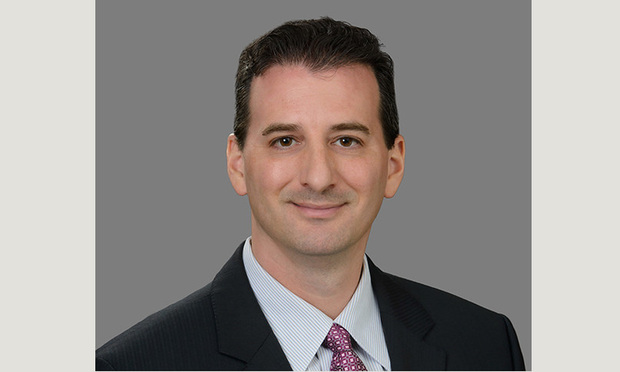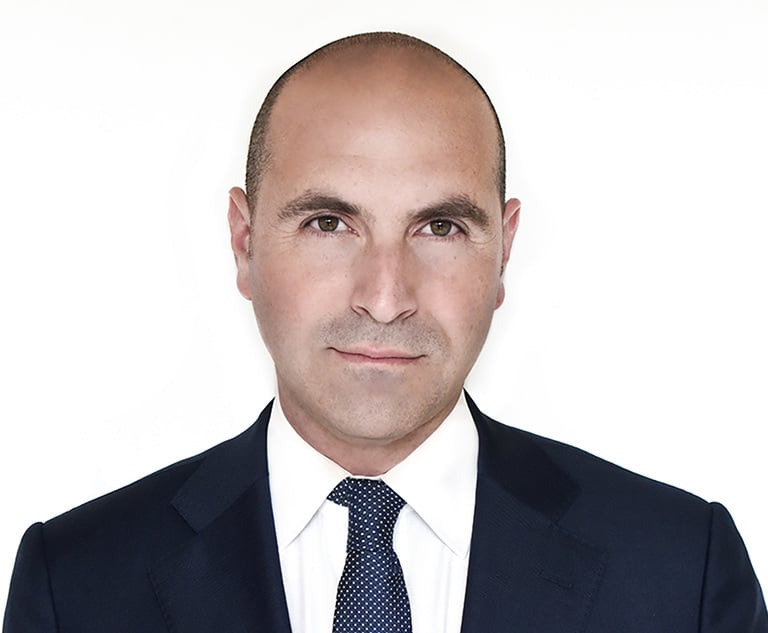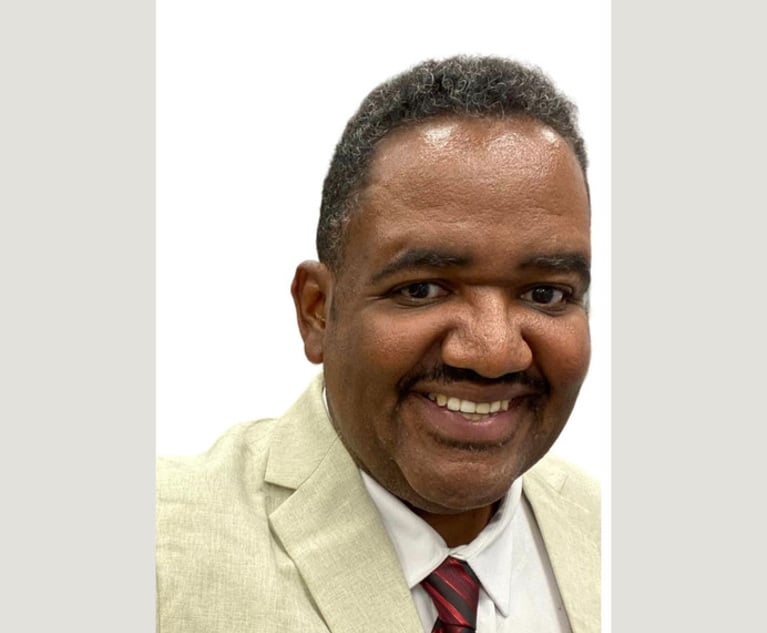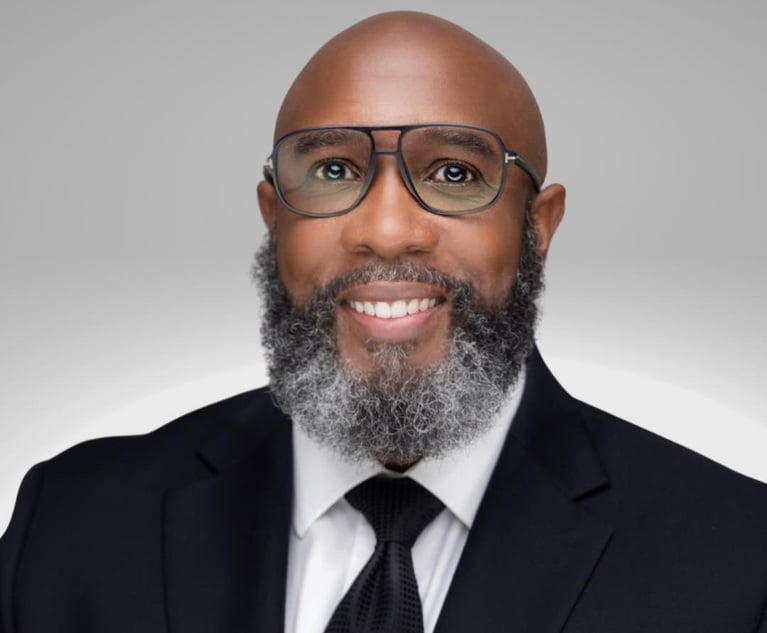There's No Business Like Show Biz Law: James Sammataro Pulls Back the Curtain
Stroock & Stroock & Lavan's head of media and entertainment law James Sammataro reveals what it's like to represent Fortune 500 companies, celebrities and media producers in lawsuits across the country.
February 08, 2019 at 02:44 PM
7 minute read
 James Sammataro of Stroock & Stroock & Lavan in Miami. Courtesy photo.
James Sammataro of Stroock & Stroock & Lavan in Miami. Courtesy photo.
Attending a concert with an entertainment lawyer might sound like a good idea, but it's not, according to Stroock & Stroock & Lavan's Miami managing partner James Sammataro.
“I am the worst person to go to a concert with,” Sammataro said. “Most people will be like, 'Oh my god, the backup dancers are great.' But I'm like, 'Oh my god, did you see those pyrotechnics? Do you know what the insurance probably is on that?' ”
Sammataro has always been fascinated by the effort it takes to plan, construct and pull off a successful show, movie or piece of music. It's therefore not unusual to find Sammataro, a self-professed “ academic geek,” at his desk before sunrise because he can't wait to tackle a case.
“I haven't had a night ever since I started the practice of law where I've had that Sunday night school feeling, like, 'Oh god, I have to go to school tomorrow.' I don't feel that way,” he said.
About a year ago, Sammataro took on a copyright case involving the movie “Midnight Sun,” starring Patrick Schwarzenegger, son of Arnold Schwarzenegger. Sammataro's client, the filmmakers, had obtained rights to base their movie on an old Japanese film, but a lawsuit claimed they'd infringed upon an independent screenplay based on the same Japanese tale.
“The first day I got the case I came into the office at 3 a.m.,” Sammataro said. ”Not because I had a deadline, but because I couldn't wait to watch the Japanese movie and to read the script.”
 James Sammataro with singer and songwriter Enrique Iglesias. Courtesy photo.
James Sammataro with singer and songwriter Enrique Iglesias. Courtesy photo.Entertainment law has taken Sammataro down numerous rabbit holes — often involving copyright infringement, trademark and defamation claims, or breach of contract fights between media companies and their talent.
He's represented media giants Amazon, Sony, Spotify and Univision, and argued for singer-songwriter Enrique Iglesias when he sued an international streaming service over royalties.
Sammataro's cases send him to California and New York so often that he's developed a nucleus of lawyer friends in each jurisdiction. It's also fun, in Sammataro's opinion, to learn how out-of-state legal communities march to a different drum.
“I think having the exposure to it, and realizing the need to adjust and adapt has made me a better lawyer,” he said. “There are different judicial aspects, different temperaments. Even the way lawyers speak to each other in each market is dramatically different.”
Related story: Enrique Iglesias, Backed by Stroock, Sues Over Music Streaming Revenue
'Can you tell the judge I can't make it?'
Representing media companies means working with the talent's agent or lawyer, who tend to bypass the small talk, according to Sammataro.
“It's not quite Ari Gold From 'Entourage,' but there's a certain lack of formality that you just have to get used to,” Sammataro said. ”It's like, 'Let's just cut to the chase. Don't BS me. What's the number? Just give me the number.' It sounds stereotypical but that actually is kind of how it works.”
Sammataro's duty remains the same whether a client is famous or not, but there are certain things to bear in mind when representing celebrities.
“While they're incredibly talented and sophisticated at what they do, the legal system is completely foreign to them,” Sammataro said. “Sometimes you have really basic requests and the talent will say, 'Well, can you tell the judge I can't make it tomorrow?' You really have to be very careful about how you explain the process, how you have to manage expectations, and you have to not be in awe of them.”
The key, according to Sammataro, is to give the client good advice, no matter how painful.
“Really successful people, whether they're celebrities or business people, tend to be surrounded by people whose job is in part to tell them what they want to hear,” Sammataro said. “At times, you need to be the bearer of reality and sometimes the bearer of bad news.”
There's just one misconception Sammataro wants to clear up: Yes, entertainment law has novel components, but it's still litigation.
“We still do discovery. We still do some of the parts of litigation that would be the bane of some people's existence,” Sammataro said. “I have no delusions as to whether or not I should be anywhere near the stage. We're in the service business.”
Writing Giuliani's 'puff pieces'
Sammataro took his first professional job in 1996 — writing speeches for then-New York City Mayor Rudy Giuliani, who held daily press conferences.
“They were puff pieces,” Sammataro said. “I was not writing the speeches for detailed political debates. We were giving the key to the city, for example, or some form of declaration, like, 'Let's thank Howard Schafer for making New York safer.' ”
Though it was good practice for Sammataro's law degree, that job began and ended his aspirations to work in backstage politics. Before long, he'd fully committed to the advice his numerous Italian uncles had given since he was 5, which was, “ You talk a lot, you should be a lawyer.”
The industry has transformed since Sammataro found his first client “through luck” as a summer associate at Cooley Godward, now Cooley LLP.
“It was a slow day, and they sent me across the street to take notes at a music law symposium, I think just to get rid of me because there wasn't much to do,” Sammataro said. “These guys were on the stage and talking about this thing they'd invented, this 'MP3', and how it was going to change the music space.”
Sammataro wasn't sure what this new file compressor idea was all about, but had a feeling the company might be inadvertently waiving some rights. So he hung around afterwards to tell them — founders of revolutionary music platform MP3.com — that they might want to speak to a lawyer about their new company.
They did. That move led them to hire Cooley Godward and become Sammataro's first entertainment client. Since then, the intersection of music and law has intensified.
“Each and every evolution of technology raises some incredibly complex issues of copyright law,” Sammataro said. “Stuff that was certainly not foreseen by the Founding Fathers when they wrote the Constitution.”
The ”Blurred Lines” decision, for example, which found Robin Thicke's song infringed upon Marvin Gaye's “Got to Give it up,” shocked many in the industry, including Sammataro.
“Where is the line between infringement and inspiration? That's still a very big question,” he said.
And there's always a new brief to read, case to follow or trend to watch, because in Sammataro's mind, “the minute you think you know anything, you don't know squat.”
But at least for Sammataro and his Miami team, work doesn't have to feel like work.
“Collectively, we bounce and reverberate off each other,” he said. “We take no prisoners when we litigate, but in the interim, we're going to smile and we're going to have fun while we're doing it.”
James G. Sammataro
Born: July 1973, Methuen, Massachusetts
Spouse: Cristina Avello Sammataro
Children: Alejandra, Olivia and Federico
Education: Duke University School of Law, J.D., 1999; Cornell University, B.A., 1995
Experience: Shareholder/managing partner of Miami office, Stroock & Stroock & Lavan, 2012-present; Partner, Kasowitz, Benson, Torres & Friedman, 2009-2012; Co-founder, Silverman Cosgrove & Sammataro, 2008-2009; Associate/shareholder, Akerman Senterfitt, 2001-2007; Associate, Cooley Godward, 1999-2000.
More attorney profiles:
How a Teenage Scrape With Cops Galvanized Jayne Weintraub's Career as Criminal Defense Lawyer
'Star Trek' and Separations: Attorney Cynthia Greene's Bold Journey Into Family Law
How No-Nonsense Litigator Michael Budwick Curbs the Damage Caused by Ponzi Schemers
This content has been archived. It is available through our partners, LexisNexis® and Bloomberg Law.
To view this content, please continue to their sites.
Not a Lexis Subscriber?
Subscribe Now
Not a Bloomberg Law Subscriber?
Subscribe Now
NOT FOR REPRINT
© 2025 ALM Global, LLC, All Rights Reserved. Request academic re-use from www.copyright.com. All other uses, submit a request to [email protected]. For more information visit Asset & Logo Licensing.
You Might Like
View All
Growing Referral Network, Alternative Fees Have This Ex-Big Law’s Atty’s Bankruptcy Practice Soaring
5 minute read
Against the Odds: Voters Elect Woody Clermont to the Broward Judicial Bench
4 minute read
Miami Civil Judge Myriam Lehr to Say Goodbye to the County Court Bench
4 minute readTrending Stories
Who Got The Work
J. Brugh Lower of Gibbons has entered an appearance for industrial equipment supplier Devco Corporation in a pending trademark infringement lawsuit. The suit, accusing the defendant of selling knock-off Graco products, was filed Dec. 18 in New Jersey District Court by Rivkin Radler on behalf of Graco Inc. and Graco Minnesota. The case, assigned to U.S. District Judge Zahid N. Quraishi, is 3:24-cv-11294, Graco Inc. et al v. Devco Corporation.
Who Got The Work
Rebecca Maller-Stein and Kent A. Yalowitz of Arnold & Porter Kaye Scholer have entered their appearances for Hanaco Venture Capital and its executives, Lior Prosor and David Frankel, in a pending securities lawsuit. The action, filed on Dec. 24 in New York Southern District Court by Zell, Aron & Co. on behalf of Goldeneye Advisors, accuses the defendants of negligently and fraudulently managing the plaintiff's $1 million investment. The case, assigned to U.S. District Judge Vernon S. Broderick, is 1:24-cv-09918, Goldeneye Advisors, LLC v. Hanaco Venture Capital, Ltd. et al.
Who Got The Work
Attorneys from A&O Shearman has stepped in as defense counsel for Toronto-Dominion Bank and other defendants in a pending securities class action. The suit, filed Dec. 11 in New York Southern District Court by Bleichmar Fonti & Auld, accuses the defendants of concealing the bank's 'pervasive' deficiencies in regards to its compliance with the Bank Secrecy Act and the quality of its anti-money laundering controls. The case, assigned to U.S. District Judge Arun Subramanian, is 1:24-cv-09445, Gonzalez v. The Toronto-Dominion Bank et al.
Who Got The Work
Crown Castle International, a Pennsylvania company providing shared communications infrastructure, has turned to Luke D. Wolf of Gordon Rees Scully Mansukhani to fend off a pending breach-of-contract lawsuit. The court action, filed Nov. 25 in Michigan Eastern District Court by Hooper Hathaway PC on behalf of The Town Residences LLC, accuses Crown Castle of failing to transfer approximately $30,000 in utility payments from T-Mobile in breach of a roof-top lease and assignment agreement. The case, assigned to U.S. District Judge Susan K. Declercq, is 2:24-cv-13131, The Town Residences LLC v. T-Mobile US, Inc. et al.
Who Got The Work
Wilfred P. Coronato and Daniel M. Schwartz of McCarter & English have stepped in as defense counsel to Electrolux Home Products Inc. in a pending product liability lawsuit. The court action, filed Nov. 26 in New York Eastern District Court by Poulos Lopiccolo PC and Nagel Rice LLP on behalf of David Stern, alleges that the defendant's refrigerators’ drawers and shelving repeatedly break and fall apart within months after purchase. The case, assigned to U.S. District Judge Joan M. Azrack, is 2:24-cv-08204, Stern v. Electrolux Home Products, Inc.
Featured Firms
Law Offices of Gary Martin Hays & Associates, P.C.
(470) 294-1674
Law Offices of Mark E. Salomone
(857) 444-6468
Smith & Hassler
(713) 739-1250







